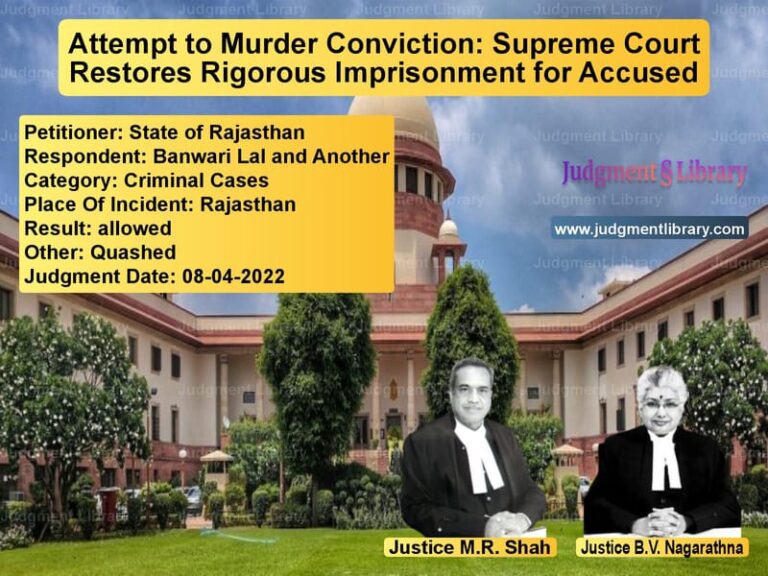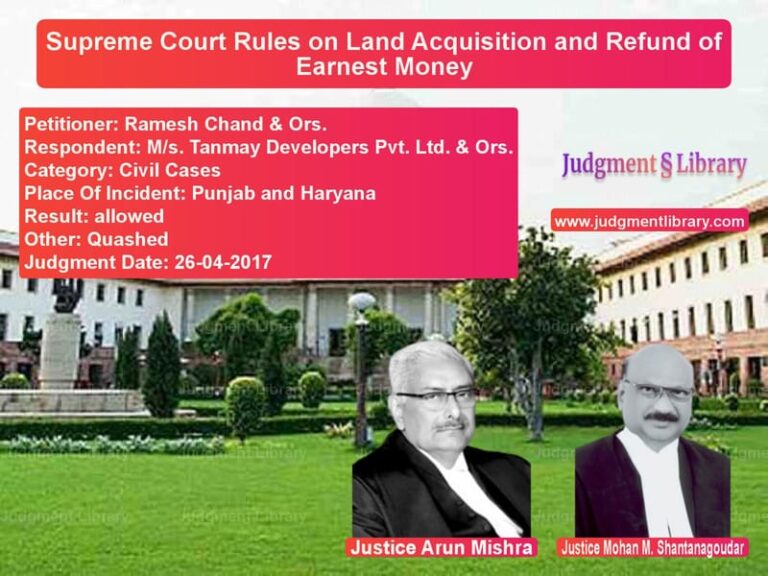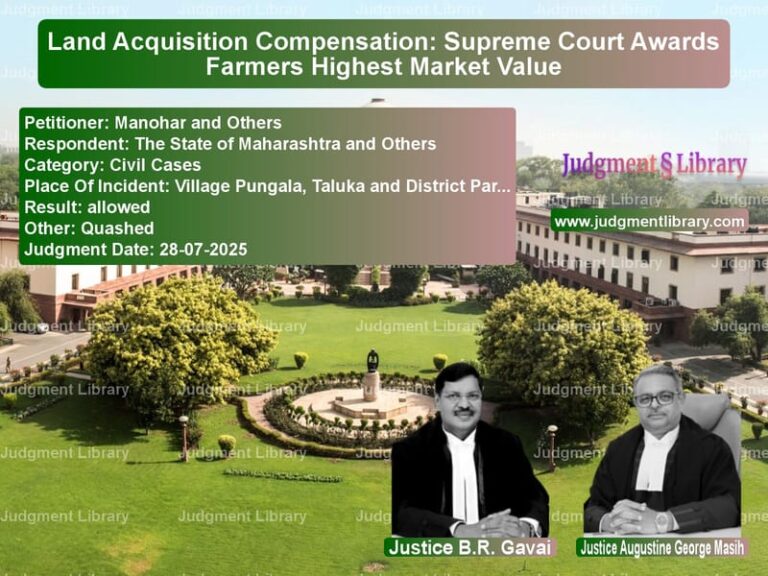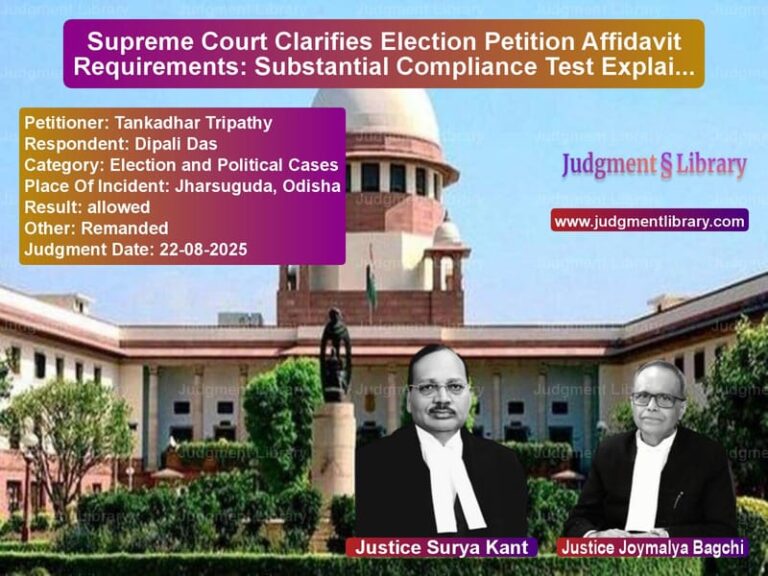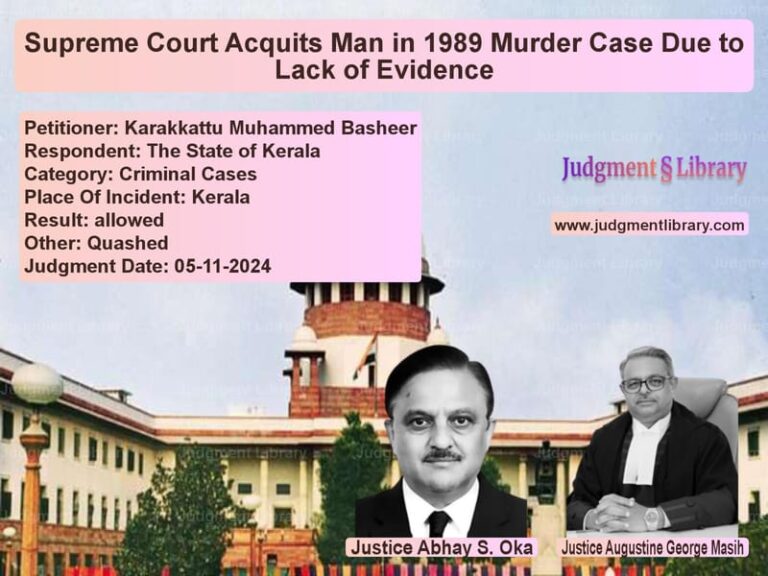Murder Conviction Upheld: Supreme Court Analyzes Circumstantial Evidence in Wazir Khan Case
The Supreme Court of India recently adjudicated a crucial case involving the brutal murder of a woman, where the primary accused was her husband. The case, Wazir Khan vs. State of Uttarakhand, revolved around the murder of the appellant’s wife, Bushra, and the legal validity of circumstantial evidence. The ruling, delivered by J.B. Pardiwala and Manoj Misra, upheld the conviction of Wazir Khan under Sections 302 and 201 of the Indian Penal Code (IPC), rejecting his defense that robbers were responsible for the crime.
Background of the Case
The case originated from a brutal murder committed on the night of January 22-23, 2007. The deceased, Bushra, was the wife of the appellant, Wazir Khan. The police were informed about the murder through a phone call on July 23, 2007, by Mohd. Hayyat. Upon arrival, law enforcement discovered multiple stab wounds on the deceased’s body.
During the investigation:
- The post-mortem report revealed 17 incised wounds on the deceased’s body.
- Wazir Khan was arrested and interrogated.
- In his statement, Wazir Khan claimed that robbers had entered their house, killed his wife, and injured him as well.
- The police recovered the murder weapon – a bloodstained knife – from the crime scene.
Trial Court Verdict
Wazir Khan stood trial in the Court of Additional Sessions Judge, Roorkee, District Haridwar, Uttarakhand. However, the trial court acquitted him of all charges, citing lack of conclusive evidence.
Key observations by the trial court:
- The prosecution failed to prove guilt beyond a reasonable doubt.
- The case was based on circumstantial evidence with no direct eyewitnesses.
- There was no forensic confirmation linking the murder weapon to Wazir Khan.
High Court Appeal and Reversal
Aggrieved by the acquittal, the State of Uttarakhand challenged the decision before the High Court of Uttarakhand. Upon re-evaluating the evidence, the High Court found the trial court’s reasoning to be perverse and reversed the acquittal, convicting Wazir Khan under Sections 302 and 201 IPC.
Arguments by the Appellant (Wazir Khan)
The appellant’s counsel, Dr. Rajesh Pandey, contended:
- The High Court erred in overturning the well-reasoned judgment of acquittal.
- Conviction based solely on circumstantial evidence was improper.
- The prosecution failed to establish any direct link between Wazir Khan and the crime.
- His presence at the crime scene did not automatically imply guilt.
- The forensic evidence was inconclusive since the murder weapon was not sent for serological analysis.
Arguments by the Respondent (State of Uttarakhand)
Opposing the appeal, counsel for the State, Mr. Abhishek Atery, argued:
- Wazir Khan was present in the house at the time of the murder.
- Section 106 of the Indian Evidence Act applies – the burden of proof shifts to the accused when an incident occurs inside his home.
- The appellant’s explanation (that robbers killed his wife) was false.
- The murder weapon was recovered from the house, further implicating him.
Supreme Court’s Analysis
The Supreme Court analyzed the evidence and highlighted key circumstantial facts:
- Wazir Khan’s relationship with the deceased was strained.
- He admitted to being at home at the time of the murder but failed to explain what transpired.
- The defense theory of robbery was unconvincing.
- The nature of the injuries suggested deliberate intent.
- The recovery of the murder weapon from the scene pointed towards his involvement.
Key Observations by the Supreme Court
The Supreme Court emphasized that when a crime occurs within the four walls of a home, the accused bears the responsibility to explain the circumstances. The Court cited State of West Bengal v. Mir Mohammad Omar (2000) 8 SCC 382, where it was held:
“When it is proved to the satisfaction of the court that the deceased was last seen with the accused in his dwelling home, the accused alone knew what happened. If the accused fails to offer an explanation or gives a false answer, it provides an additional link in the chain of circumstances.”
The Court further noted that benefit of doubt should not be extended merely on flimsy grounds:
“The rule of benefit of reasonable doubt does not imply a frail willow bending to every whiff of hesitancy. Judges must take a practical view of legitimate inferences flowing from circumstantial evidence.”
Final Verdict
The Supreme Court upheld the conviction of Wazir Khan, dismissing his appeal. The Court ruled:
- The High Court was justified in reversing the trial court’s acquittal.
- The circumstantial evidence provided a complete chain linking Wazir Khan to the crime.
- The defense failed to offer a credible alternative explanation.
- The murder conviction under Section 302 IPC was legally sound.
The ruling reaffirms the principle that an accused cannot escape liability by merely raising hypothetical doubts when overwhelming circumstantial evidence establishes guilt.
Petitioner Name: Wazir Khan.Respondent Name: State of Uttarakhand.Judgment By: Justice J.B. Pardiwala, Justice Manoj Misra.Place Of Incident: Roorkee, Uttarakhand.Judgment Date: 02-08-2023.
Don’t miss out on the full details! Download the complete judgment in PDF format below and gain valuable insights instantly!
Download Judgment: wazir-khan-vs-state-of-uttarakhand-supreme-court-of-india-judgment-dated-02-08-2023.pdf
Directly Download Judgment: Directly download this Judgment
See all petitions in Murder Cases
See all petitions in Judgment by J.B. Pardiwala
See all petitions in Judgment by Manoj Misra
See all petitions in dismissed
See all petitions in supreme court of India judgments August 2023
See all petitions in 2023 judgments
See all posts in Criminal Cases Category
See all allowed petitions in Criminal Cases Category
See all Dismissed petitions in Criminal Cases Category
See all partially allowed petitions in Criminal Cases Category


